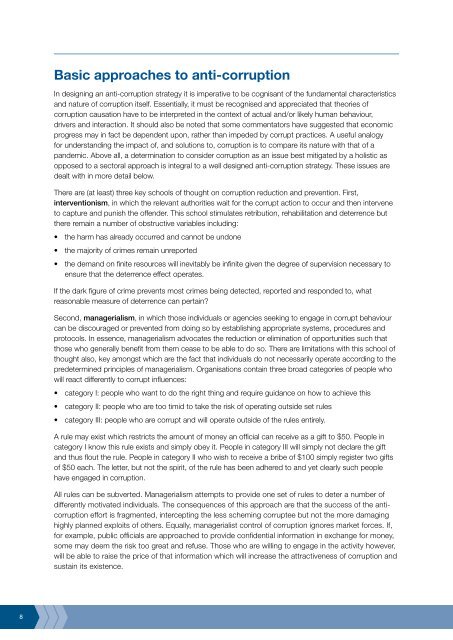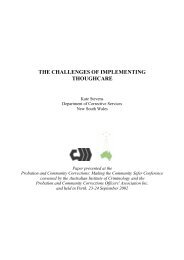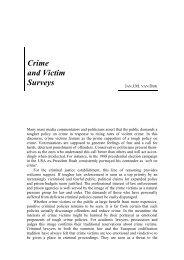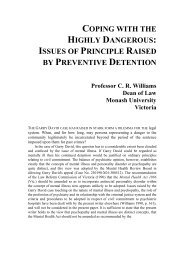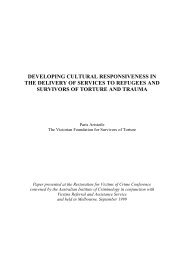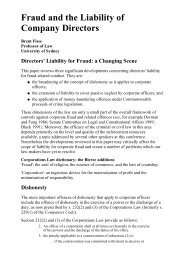Review of anti-corruption strategies Rob McCusker - Australian ...
Review of anti-corruption strategies Rob McCusker - Australian ...
Review of anti-corruption strategies Rob McCusker - Australian ...
Create successful ePaper yourself
Turn your PDF publications into a flip-book with our unique Google optimized e-Paper software.
Basic approaches to <strong>anti</strong>-<strong>corruption</strong><br />
In designing an <strong>anti</strong>-<strong>corruption</strong> strategy it is imperative to be cognisant <strong>of</strong> the fundamental characteristics<br />
and nature <strong>of</strong> <strong>corruption</strong> itself. Essentially, it must be recognised and appreciated that theories <strong>of</strong><br />
<strong>corruption</strong> causation have to be interpreted in the context <strong>of</strong> actual and/or likely human behaviour,<br />
drivers and interaction. It should also be noted that some commentators have suggested that economic<br />
progress may in fact be dependent upon, rather than impeded by corrupt practices. A useful analogy<br />
for understanding the impact <strong>of</strong>, and solutions to, <strong>corruption</strong> is to compare its nature with that <strong>of</strong> a<br />
pandemic. Above all, a determination to consider <strong>corruption</strong> as an issue best mitigated by a holistic as<br />
opposed to a sectoral approach is integral to a well designed <strong>anti</strong>-<strong>corruption</strong> strategy. These issues are<br />
dealt with in more detail below.<br />
There are (at least) three key schools <strong>of</strong> thought on <strong>corruption</strong> reduction and prevention. First,<br />
interventionism, in which the relevant authorities wait for the corrupt action to occur and then intervene<br />
to capture and punish the <strong>of</strong>fender. This school stimulates retribution, rehabilitation and deterrence but<br />
there remain a number <strong>of</strong> obstructive variables including:<br />
•<br />
•<br />
•<br />
the harm has already occurred and cannot be undone<br />
the majority <strong>of</strong> crimes remain unreported<br />
the demand on finite resources will inevitably be infinite given the degree <strong>of</strong> supervision necessary to<br />
ensure that the deterrence effect operates.<br />
If the dark figure <strong>of</strong> crime prevents most crimes being detected, reported and responded to, what<br />
reasonable measure <strong>of</strong> deterrence can pertain?<br />
Second, managerialism, in which those individuals or agencies seeking to engage in corrupt behaviour<br />
can be discouraged or prevented from doing so by establishing appropriate systems, procedures and<br />
protocols. In essence, managerialism advocates the reduction or elimination <strong>of</strong> opportunities such that<br />
those who generally benefit from them cease to be able to do so. There are limitations with this school <strong>of</strong><br />
thought also, key amongst which are the fact that individuals do not necessarily operate according to the<br />
predetermined principles <strong>of</strong> managerialism. Organisations contain three broad categories <strong>of</strong> people who<br />
will react differently to corrupt influences:<br />
•<br />
•<br />
•<br />
category I: people who want to do the right thing and require guidance on how to achieve this<br />
category II: people who are too timid to take the risk <strong>of</strong> operating outside set rules<br />
category III: people who are corrupt and will operate outside <strong>of</strong> the rules entirely.<br />
A rule may exist which restricts the amount <strong>of</strong> money an <strong>of</strong>ficial can receive as a gift to $50. People in<br />
category I know this rule exists and simply obey it. People in category III will simply not declare the gift<br />
and thus flout the rule. People in category II who wish to receive a bribe <strong>of</strong> $100 simply register two gifts<br />
<strong>of</strong> $50 each. The letter, but not the spirit, <strong>of</strong> the rule has been adhered to and yet clearly such people<br />
have engaged in <strong>corruption</strong>.<br />
All rules can be subverted. Managerialism attempts to provide one set <strong>of</strong> rules to deter a number <strong>of</strong><br />
differently motivated individuals. The consequences <strong>of</strong> this approach are that the success <strong>of</strong> the <strong>anti</strong><strong>corruption</strong><br />
effort is fragmented, intercepting the less scheming corruptee but not the more damaging<br />
highly planned exploits <strong>of</strong> others. Equally, managerialist control <strong>of</strong> <strong>corruption</strong> ignores market forces. If,<br />
for example, public <strong>of</strong>ficials are approached to provide confidential information in exchange for money,<br />
some may deem the risk too great and refuse. Those who are willing to engage in the activity however,<br />
will be able to raise the price <strong>of</strong> that information which will increase the attractiveness <strong>of</strong> <strong>corruption</strong> and<br />
sustain its existence.


